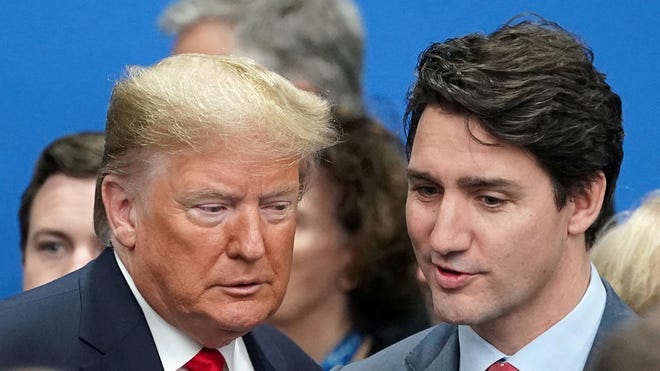Some retailers are telling Americans to hurry up and buy items they need before tariffs raise prices next year but financial experts say that’s bad advice.
President-elect Donald Trump has vowed to slap a new 25% across-the-board tariff on imports from Mexico and Canada and an additional 10% tariff on goods from China on the first day of his presidency. While campaigning, he floated a 60% tariff on goods imported from China and a 10% to 20% tariff on goods from other countries.
Economists have said consumers would shoulder those costs, igniting widespread panic that everything from iPhones to bicycles, refrigerators, couches and buttons would be more expensive next year. But financial advisers say that’s a poor way to spend your money. Instead of hoarding items you think might get slapped with a tariff, they recommend you build stronger finances.
“Tune out the noise and focus on the economy of one – you and your priorities,” said Bobbi Rebell, certified financial planner and personal finance expert at BadCredit.org. “Don’t ever spend in panic mode.”
How should Americans prepare for the next Trump administration?
First, experts say, don’t make financial plans based on the prospect of tariffs. As Federal Reserve Chairman Jerome Powell put it at a news conference on Wednesday, “We have to let this play out.”
Maximize your savings: Best high-yield savings accounts
The tariffs are theoretical at this point.
“We don’t know how big they’ll be,” Powell said. “We don’t know the timing and duration. … We can’t really start making policy on that. “
Instead, Americans should stick with what they should be doing already: saving and investing, advisers said.
How to invest in a Trump world
Though no one knows how tariffs will shake out, Trump has thrown support behind broader policies that Americans can use to tweak their investments, advisers said.
Among other suggestions, advisers said, to keep these factors in mind when investing:
Remember, stock market gains will likely come in fits and starts, they said. If you can’t stomach volatility or are already retired, Treasury bills, certificates of deposit and high-yield savings accounts pay between 4% and 5%, which “isn’t bad,” said Phil Battin, president and chief executive of Ambassador Wealth Management in Warrenville, Ill.
Investors might also want to consider buying a buffered exchange-traded fund (ETF), advisers said. These allow you to keep a toe in the stock market but limit your losses in exchange for giving up some of your potential gains over a set period, typically a year. These funds cost a bit more than a typical ETF and come in various risk-reward combinations. Generally, the higher the downside protection, the smaller the potential gain.
More:ETFs vs mutual funds: What’s the difference? How to choose which to buy.
Since buffered ETFs are structured to work within a certain timeframe, you should buy at the start of the period and sell at the end. If you buy after the ETF period has started it could limit your gains. On the other end, experts warn that selling too early could expand your losses.
Retirees can also consider income-producing assets like dividend stocks, said Faron Daugs, founder and chief executive of Harrison Wallace Financial Group in Libertyville, Ill. “You’ll have stock price movement but also get a dividend no matter what the market’s doing,” he said.
Will I be able to save in a Trump administration?
Don’t buy things earlier than planned because of fears that tariffs will increase prices. Purchasing now on a credit card doesn’t help your finances if you’re paying a high interest rate on the balance, Rebell, the finance expert, said. The average credit card interest rate is around 20.37%, not far from the record-high 20.79% on Aug. 14, according to Bankrate.
Instead, use that money to “pay down credit card debt, improve your score and give yourself a discount with better loan terms,” whether it’s for a home, car or refrigerator next year, Rebell said.
If prices rise next year on some items, she said, remember: “Don’t take prices at face value.”
“Original prices are imaginary in most cases. … Run your own negotiation online. Sign up for coupon sites, find a store that matches or beats (prices) and negotiate. Put it in your (online) basket and wait 24 hours, (retailers) will come back to you” with a discount, according to Rebell.
Should people worry about tariff inflation?
Advisers told USA TODAY at this point, Trump’s tough tariff talk is just that – talk.
“Nothing has changed other than jawboning,” said Steven Conners, founder and president of Conners Wealth Management in Scottsdale, Ariz. “This is still first-inning stuff.”
Financial pros see the tariff threats as “a negotiating tool” like the president-elect used in his first administration,” Daugs, of Harrison Wallace Financial Group, said. “And we didn’t have significantly high inflation then.”
Should they come to fruition, Trump’s plans for deregulation should save companies money and help offset some of the tariffs, Daugs said, adding, “I’m not concerned with runaway inflation.”
Battin, of Ambassador Wealth Management, noted that China’s economy is weaker now than it was last time Trump was president which should limit tit-for-tat tariffs. “Calling it a (potential) ‘tariff war’ is misleading,” he said.
They also pointed to the same gloomy predictions economists made in 2016 when Trump first won the first time, which turned out wrong.
“Fear is a liar,” Battin said. “Buying or selling under greed ends poorly.”
Medora Lee is a money, markets and personal finance reporter at USA TODAY. You can reach her at [email protected] and subscribe to our free Daily Money newsletter for personal finance tips and business news every Monday through Friday morning.

